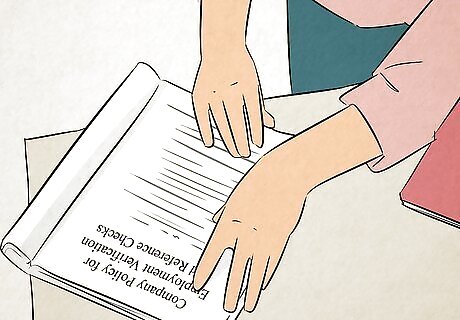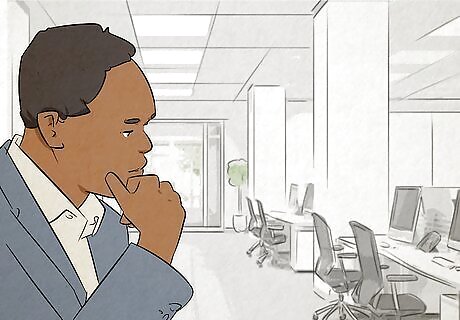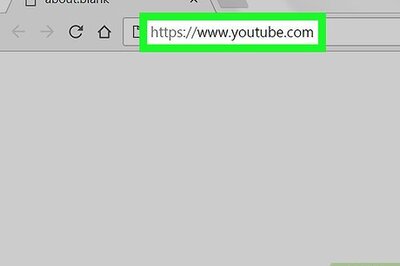
views
Hearing the News and Understanding the Circumstances

Remain calm, professional, and positive. You want to be able to leave your job on the best terms possible given your situation. Your future employment may depend on your ability to stay calm in the present. There may be friendships and/or professional connections between your current company's employees and potential employers. Plus, your current company may be contacted as a reference. Therefore, you must do your best to remain calm and stay professional by doing the following: Listen to what your employer has to say. It may be tough to keep quiet but in order to understand the situation, you must listen. Do not argue. No matter the circumstances, the decision has been made by your employer. As a courtesy to you they are giving you an option to either resign or stay and wait to be fired. Arguments and pleas will not change their minds. Do not cause a scene up until you leave for good. The meeting can go very differently if you act out and the employer rescinds your option to resign. If you pose any threat or you are unprofessional, you will be asked to leave and escorted out the building by security. If this happens there will be negative implications such as bad references, bad impressions, possible ineligibility for unemployment or company benefits and possible legal issues.

Understand the full reasons you are being asked to resign. Most likely you already understand the circumstances surrounding your choice to resign because you have been spoken to already, have a feeling something is going on or know you have done something undesirable. However, if you do not fully understand, you must ask questions. Knowing the exact reasons for asking you to resign will help you make your decision about whether to stay or wait to be fired. For example, if you are being asked to leave because your position is being eliminated, then resigning will leave you without unemployment benefits and it may be best to wait to be fired. If you are asked to leave because you have engaged in prohibited acts defined by the company, it may be best to resign because of possible negative implications and ineligibility for unemployment.

Know company policy for employment verification and reference checks. Before making your decision to resign or wait to be fired, it is important to know what the company policy is for employment verification and reference checks. This means knowing the type of information that is allowed to be released when a potential future employer calls the company for information. Information that may be released includes: Dates of employment. Title. Salary. Eligibility for rehire. If left on good terms or not. Reason for leaving. Character and personal traits. Work ethic.

Know that you have the right to think it over. At this point you only have two options, resign or wait to be fired. You do not need to sign any paperwork or write a resignation letter immediately because you have the right to think over your options. There are pros and cons to both resigning and waiting to be fired and it is important to weigh your options before agreeing to something. Your employer may try to bully you but they cannot force you to make a decision immediately. Either way you are leaving the company very soon but you must do what is best for your situation and your future.
Evaluating Your Options and Making a Decision

Evaluate the pros and cons of resigning. As mentioned previously, there are pros and cons to each option that need to be taken into consideration before making a decision. The major con to resigning is that you most likely will not be eligible for unemployment benefits. Some pros to resigning include: Being able to spin your reason for leaving positively. You do not need to say you were fired or asked to leave. The reason given for termination by your employer will be “resignation”. You may be able to negotiate a severance package. The company wants you to leave and at this point you may have the upper hand in a way, even if you don't feel like that's the case. In exchange for you leaving peacefully, you may be able to negotiate a severance package to include a few months of pay and benefits.

Evaluate the pros and cons of waiting to be fired. The pros to waiting to be fired can outweigh the cons if you need the unemployment benefits and feel you will be eligible given your circumstances. If you are fired for no reason of your own, you have a very good change to receive these benefits. Additionally, if you feel your termination is wrongful and/or discriminatory, you may be able to file a suit against this employer. On the other hand, the cons to waiting to be fired include: You may not eligible for a severance package. You may receive bad references if another company contacts this employer. Your reason for termination will be stated as “fired” or “terminated” and possible reasons for termination can be disclosed (based on company policy as mentioned previously). For example, “The employee was terminated due to gross misconduct”.

Make a decision that is right for you and notify your employer. Based on your evaluation of the pros and cons to both options, you must make a decision and express this to your employer as soon as possible. If you took some time out to make your decision, you will have to request another meeting to include all members in the original meeting. During the meeting: Briefly explain whether you have decided to resign or stay. Keep your explanation simple and professional. Do not get overly emotional or angry. Be prepared to leave that day. The employer may not take any chances and open themselves up to any risk by letting a possible disgruntled employee stay on the premises. If you have chosen to wait to be fired, be prepared to be fired that day.

Prepare to move on. Be prepared to move on once you have made your decision and notified your employer. Since you will be leaving your position one way or another, it is now time for you to prepare yourself for your next career move.




















Comments
0 comment